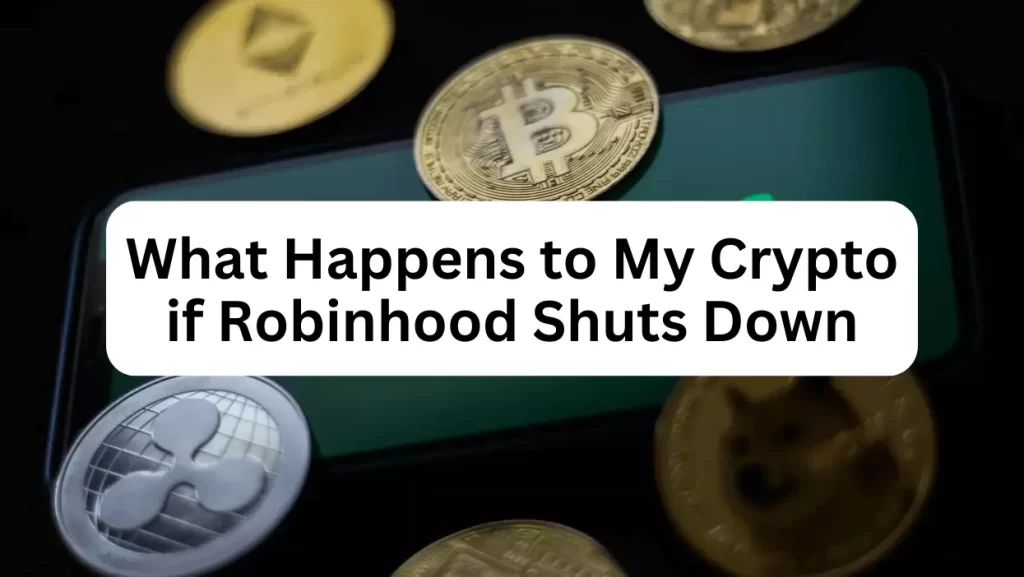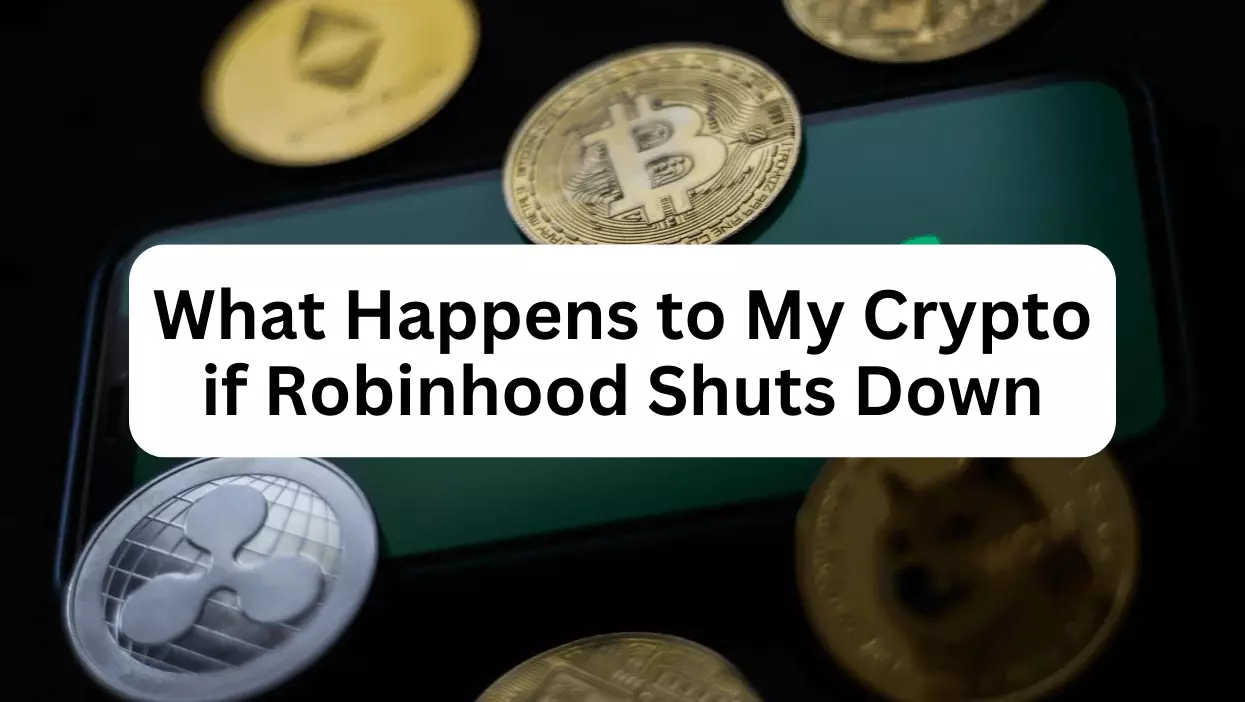
Introduction
Picture this: you’ve been trading cryptocurrencies on Robinhood, enjoying its user-friendly interface and convenience. But what if one day, Robinhood shuts down? It’s a valid concern that many crypto enthusiasts share. As an avid investor, I’ve delved into the depths of this question to understand what might happen to your precious digital assets. I’m no fortune teller, but I can illuminate the possible scenarios if Robinhood ceases its operations. So, grab a seat and let’s explore the realm of crypto uncertainty together. Fortunately, the answer isn’t quite so bleak. While Robinhood’s closure could present challenges, there are steps you can take to safeguard your crypto assets. From transferring them to alternative platforms to exploring self-custody options, the path forward may not be as treacherous as it seems.
Content
What Happens to Your Crypto if Robinhood Shuts Down

As an avid crypto investor, I understand the importance of knowing what happens to your digital assets if Robinhood, the popular trading platform, were to shut down. The potential closure of Robinhood raises concerns about the fate of your hard-earned cryptocurrency holdings. I’ll walk you through the possible outcomes and steps you can take to protect your investments.
Related suggestions: What is AMP Crypto Quiz
The Process and Steps During a Shutdown
If Robinhood were to shut down, you might wonder about the fate of your crypto assets. While the specific details may vary, there are general steps that typically occur in such situations:
- Suspension of Trading: First, Robinhood would likely suspend all trading activities, preventing users from making further transactions.
- Asset Transfer: Depending on the circumstances, Robinhood may facilitate the transfer of your crypto assets to an alternative platform or wallet. This transfer process ensures that you retain control over your holdings.
- Communication and Updates: Robinhood would communicate with its users throughout the shutdown process, providing updates and instructions on accessing or transferring their assets.
Possibilities for Transferring Your Crypto Assets
You can transfer your crypto assets to alternative platforms or wallets during a shutdown. These options include:
- External Wallets: If you don’t already have one, setting up an external wallet, such as a hardware wallet or a reputable software wallet, can give you direct control over your crypto assets. Transferring your holdings to an external wallet would ensure their safety, regardless of Robinhood’s fate.
- Alternative Exchanges: Numerous reputable cryptocurrency exchanges exist beyond Robinhood. Research and identify well-established platforms that align with your trading needs. You can initiate the process of transferring your assets from Robinhood to these platforms, safeguarding your investments.
Evaluating the Role of Third-Party Custodians
Robinhood acts as a custodian for your crypto assets. However, during a shutdown, it’s essential to assess the involvement of third-party custodians, if any, in the process. These custodians may play a role in safeguarding and facilitating the transfer of your assets, ensuring they reach their intended destination securely.
Remember, each platform and custodian may have individual policies and procedures. Thoroughly research and understand their terms and conditions before initiating any asset transfers.
Safeguarding Your Crypto Investments
To protect your crypto investments, consider the following strategies:
- Diversification: Spreading your holdings across multiple platforms and wallets reduces the risk of losing all your assets in a platform shutdown.
- Self-Custody Options: Utilize hardware wallets or software wallets that provide self-custody solutions. This way, you retain direct control and ownership of your crypto assets.
While the possibility of Robinhood shutting down may be unsettling, being proactive and well-informed can help you navigate such circumstances. You can mitigate potential risks by understanding the process and potential outcomes, exploring transfer options, and implementing strategies to safeguard your investments. Remember, staying informed and adaptable in the dynamic world of cryptocurrencies is key to protecting your digital wealth.
Risks Associated with Robinhood’s Shutdown

As an experienced investor, I’ve come across various risks in the financial world, and the potential shutdown of Robinhood brings a unique set of concerns. We’ll explore the risks of Robinhood’s possible closure and how they may impact your crypto holdings. By understanding these risks, you can better prepare yourself for unforeseen circumstances.
1. Implications for Crypto Holdings
- Temporary Inaccessibility: If Robinhood shuts down, you may temporarily lose access to crypto holdings. This can be worrisome, especially if you rely on those assets for daily trading or investment strategies.
- Price Volatility: During periods of uncertainty, such as a platform shutdown, the crypto market can experience increased volatility. This can lead to sharp price fluctuations, potentially affecting the value of your holdings.
2. Asset Recovery and Potential Hurdles
- Uncertain Timelines: Asset recovery can be complex and time-consuming in a shutdown. It may take a considerable amount of time before you regain control of your crypto assets.
- Legal Considerations: There may be legal implications surrounding the recovery of your assets. Robinhood’s terms of service and user agreements will be crucial in determining your rights and the steps you can take to reclaim your holdings.
3. Alternative Platform Compatibility
- Transfer Restrictions: You may encounter restrictions or limitations when transitioning your assets from Robinhood to alternative platforms. Different platforms may support different cryptocurrencies, and the transfer process may only be seamless for some assets.
- Technical Challenges: Migrating your assets from one platform to another involves navigating technical procedures. Understanding the teach platform’sspplatform’s requirements and procedures is important to ensure a smooth transfer process.
4. Counterparty Risks
- Third-Party Custodians: In some cases, Robinhood may employ third-party custodians for storing your crypto assets. If Robinhood shuts down, these custodians might become involved in the asset recovery, potentially introducing additional risks or delays.
- Custodian Reliability: The reliability and reputation of these custodians can influence the security and recovery of your assets. Thoroughly research the custodian’s track record and their ability to safeguard and transfer your crypto holdings.
As a prudent investor, it’s essential to recognize the risks associated with the potential shutdown of Robinhood. These risks include temporary inaccessibility to your holdings, price volatility, complexities in asset recovery, compatibility issues with alternative platforms, and counterparty risks. By being aware of these risks, you can take proactive measures to mitigate potential losses and ensure the safety of your crypto investments.
Safeguarding Your Crypto Assets

As someone who values the security of their crypto investments, I understand the importance of taking proactive steps to safeguard your assets. I’ll share valuable insights and practical strategies to protect your crypto holdings, regardless of the fate of platforms like Robinhood.
1. Diversification: Spreading Your Holdings
- The Power of Distribution: Diversifying your crypto holdings across multiple platforms can help mitigate risks associated with the potential shutdown of a single platform like Robinhood. By distributing your assets, you reduce the impact of any single platform’s closure on your overall portfolio.
- Research Alternative Platforms: Explore reputable alternative platforms for trading and holding cryptocurrencies. Look for platforms with robust security measures, transparent operations, and a wide range of supported assets. By diversifying, you maintain flexibility and minimize the impact of any one platform’s closure.
2. Self-Custody Options: Taking Control
- Hardware Wallets: Consider utilizing a hardware wallet, a physical device that securely stores your private keys offline. By holding your crypto assets in a hardware wallet, you maintain complete control over your holdings, reducing reliance on third-party platforms.
- Software Wallets: Software wallets installed on your computer or smartphone provide convenient self-custody solutions. Choose reputable software wallets prioritizing security and offering features like multi-factor authentication and encrypted backups.
3. Education and Security Measures
- Stay Informed: Keep yourself updated on the latest trends, security best practices, and potential risks in the crypto industry. Regularly educate yourself about emerging threats and advancements in security technologies.
- Two-Factor Authentication (2FA): Enable 2FA on all your crypto-related accounts, including exchanges and wallets. This adds an extra layer of security by requiring an additional verification step during login.
4. Backup and Recovery
- Secure Backups: Regularly back up your wallet information, including private keys and recovery phrases. Store these backups in secure, offline locations to protect against data loss or unauthorized access.
- Recovery Processes: Familiarize yourself with the recovery procedures of your wallets and platforms. Understand the steps needed to restore your access in case of device loss, damage, or theft.
Protecting your crypto assets requires a proactive approach. By diversifying your holdings across multiple platforms, exploring self-custody options like hardware or software wallets, staying informed about security best practices, and implementing robust backup and recovery processes, you can fortify the security of your investments. Remember, the key is to take ownership of your assets and remain vigilant in an ever-evolving crypto landscape.
Related posts worth checking out: What is DBX Crypto Staking
Conclusion
In the unpredictable world of cryptocurrency, it’s crucial to be prepared for the possibility of Robinhood shutting down and impacting your crypto assets. You can safeguard your investments by understanding the potential outcomes and taking proactive measures, such as diversifying your holdings, exploring self-custody options, staying informed about security practices, and implementing robust backup and recovery procedures. Remember, being in control of your assets and staying informed are the keys to protecting your crypto holdings, regardless of any platform’s fate.
u003cstrongu003eWhat happens to my crypto if Robinhood shuts down?u003c/strongu003e
If Robinhood shuts down, there are generally two possibilities. First, Robinhood may facilitate the transfer of your crypto assets to an alternative platform or wallet, allowing you to retain control over your holdings. Alternatively, follow the shutdown procedures outlined by Robinhood, which could involve withdrawing your assets to an external wallet.
u003cstrongu003eCan I transfer my crypto assets from Robinhood to another exchange during a shutdown?u003c/strongu003e
In most cases, yes. If Robinhood shuts down, you may have the opportunity to transfer your crypto assets to another exchange or wallet. However, remember that the availability and process of transferring your assets will depend on the specific circumstances and instructions provided by Robinhood during the shutdown period.
u003cstrongu003eWill I lose access to my crypto assets during the shutdown process?u003c/strongu003e
While there may be temporary disruptions in access, typically, you should not permanently lose access to your crypto assets. Robinhood will communicate with its users throughout the shutdown process, providing updates and instructions on managing and accessing their assets during and after the shutdown.
u003cstrongu003eWhat if I have pending transactions or open orders on Robinhood when it shuts down?u003c/strongu003e
In the event of a shutdown, Robinhood will likely suspend all trading activities. Any pending transactions or open orders may be canceled or put on hold. You should closely follow the instructions provided by Robinhood to manage any pending transactions or orders.
u003cstrongu003eWhat can I do to minimize the risks if Robinhood shuts down?u003c/strongu003e
To minimize risks associated with a potential shutdown, consider diversifying your crypto holdings across multiple platforms and wallets. This way, even if Robinhood were to shut down, your assets stored on other platforms would remain unaffected. Additionally, consider setting up self-custody options, such as hardware or software wallets, to maintain direct control over your crypto assets.

Randal Daly has been following the crypto space since 2024. He is a passionate advocate for blockchain technology, and believes that it will have a profound impact on how people live their lives. In addition to being an avid blogger, Randal also enjoys writing about developments in the industry as well as providing useful guides to help those who are new to this exciting frontier of finance and technology.



